Naengmyeon
| Naengmyeon | |
|---|---|
|
A bowl of naengmyeon | |
| Alternative names | Naeng-myeon |
| Type | Soup |
| Place of origin | Korea |
| Serving temperature | Cool |
| Main ingredients | Noodles (flour and starch of buckwheat, potatoes, sweet potatoes) |
| Variations | Mul naengmyeon, bibim naengmyeon |
|
| |
| Naengmyeon | |
| Chosŏn'gŭl | 랭면 or 냉면 |
|---|---|
| Hancha | 冷麵 |
| Revised Romanization | raengmyeon or naengmyeon |
| McCune–Reischauer | raengmyŏn or naengmyŏn |
Naengmyeon (Korean: 랭면 (North Korea), 냉면 (South Korea), also known as raengmyeon (in North Korea), naeng-myeon, naengmyun, or naeng-myun, meaning "cold noodles") is a Korean noodle dish of long and thin handmade noodles made from the flour and starch of various ingredients: buckwheat (메밀, memil), potatoes, sweet potatoes, 칡냉면, naengmyun made with the starch from arrowroot (darker color and chewier than buckwheat noodles), and kudzu (칡, chik). Varieties with ingredients such as seaweed and green tea are available. According to the 19th century documents of Dongguksesigi (동국세시기, 東國歲時記), it has been made since the Joseon Dynasty.[1]
Originally a delicacy in northern Korea, especially in the cities of Pyongyang (평양, 平壤) and Hamhung (함흥, 咸興) in North Korea, naengmyeon became widely popular throughout Korea after the Korean War.[1]
Naengmyeon is served in a large stainless-steel bowl with a tangy iced broth, julienned cucumbers, slices of Korean pear, and either a boiled egg or slices of cold boiled beef or both. Spicy mustard sauce (or Mustard oil) and vinegar are often added before consumption. Traditionally, the long noodles would be eaten without cutting, as they symbolized longevity of life and good health, but servers at restaurants usually ask if the noodles should be cut prior to eating, and use scissors to cut the noodles.
Varieties
The two main varieties of naengmyeon are mul naengmyeon (물 냉면) and bibim naengmyeon (비빔 냉면). The former is served as a cold soup with the noodles contained in broth made from beef, chicken or dongchimi. The latter is served with a spicy dressing made primarily from gochujang (red chili paste) and eaten all mixed. In the case of bibim naengmyeon, a bowl of the soup broth used in mul naengmyeon or plain broth from the boiled noodles itself are often served on the side.
Mul naengmyeon originates from Pyongyang.[2] Pyŏngyang naengmyŏn is mainly made from buckwheat and the broth of beef or pheasant. It also uses dongchimi broth or a mixture of it, while adding the sliced pieces of the radish to the dish. Vinegar, mustard oil (provided on request at most restaurants), and sugar is added according to taste before eating.
A version of bibim naengmyeon originates from Hamhung,[3] the hoe naengmyeon (회 냉면). Hoe naengmyeon is bibim naengmyeon with additional marinated raw fish (hoe), usually skate. It is eaten with the spicy gochujang dressing and other ingredients all mixed. Vinegar, sugar, and sometimes sesame oil is added according to taste. The noodles of Hamhung naengmyeon are usually made from potato or sweet potato starch, so the noodles are very chewy in texture compared to those of Pyongyang naengmyeon.
Another variety of naengmyeon is yeolmu naengmyeon (열무 냉면) which is served with yeolmu kimchi.
Instant naengmyeon noodles are available, with the soup broth prepackaged with the noodles. A clear plastic package of mustard oil is often supplied.
- Naengmyeon
-
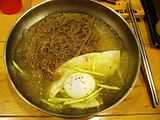
Naengmyeon sold in Seoul, South Korea.
-
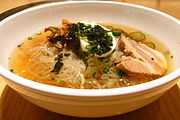
Mul naengmyeon.
-
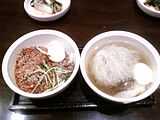
Bibim naengmyeon and Mul naengmyeon.
-
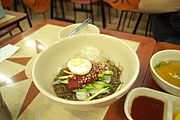
Bibim naengmyeon.
-
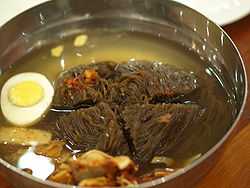
Naengmyeon
In popular culture
In the South Korean variety show Infinite Challenge, Park Myeong-su and Jessica of Girls' Generation performed the song "Naengmyeon" which was named after the food. The song became a hit and received wide acclaim.[4]
See also
References
- ↑ 1.0 1.1 , Doosan Encyclopedia
- ↑ Pyongyang naengmyeon Doosan Encyclopedia
- ↑ Hamhung naengmyeon, Doosan Encyclopedia
- ↑ Naengmyeon wins award, Newsen
External links
| Wikimedia Commons has media related to Naengmyeon. |
| ||||||||||||||||||||||||||||||||||||||||||||||||||||||||||||||||||